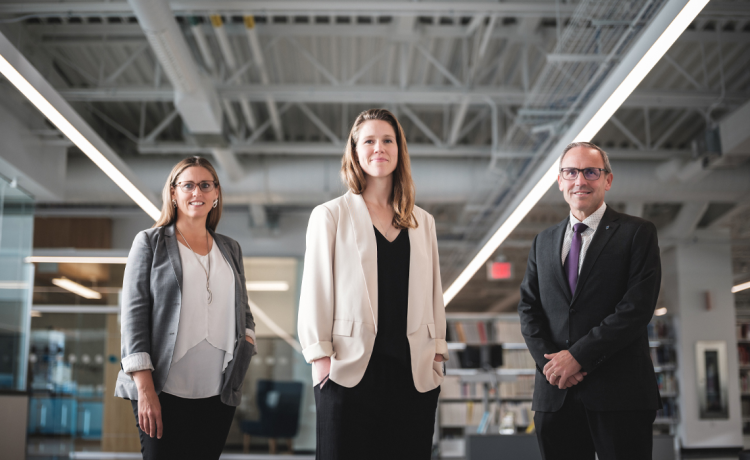Dr. Chad London, PhD, provost and vice-president academic at Mount Royal, has been pondering this question for years and was one of three MRU representatives and leaders to participate over the summer in conferences dedicated to advancing healthy campus research and action.

London previously served as dean of the College of Kinesiology at the University of Saskatchewan and dean of the Faculty of Health, Community and Education at MRU, where he took a leadership role in implementing the Okanagan Charter at both universities. That charter, developed in 2015, calls for higher education institutions to integrate health and well-being into all aspects of their culture, academics and operations.
A member of the Canadian Health Promoting Campuses Network since its inception in 2016, London has collaborated with colleagues across Canada and internationally over the last eight years on numerous research projects related to well-being in higher education contexts. His research focuses on how leaders can advance health and well-being of students, faculty, staff and the broader community.
London, who spoke on the topic at The International Health Promoting Campuses Conference in Limerick, Ireland, notes there has been a great deal of work done in this area to the benefit of the MRU community, with more to come going forward. He adds that changing systems and approaches to be more proactive can reduce the need for acute mental health supports down the line.
That can include a variety of factors such as how faculty set up and deliver their courses, supports from the university for students and built environments like social gathering spaces, the Riddell Library and Learning Centre, and the under-construction Sam Taylor Learning Commons (G-Wing renovation).
"Whether it's how you design your course, the format and timing of course assessments, or how a university uses built spaces (this interview took place in Barrow coffee shop in the RLLC), there are many ways to promote the well-being of the community," said London, who co-edited Health Promoting Universities, a book that presents approaches and strategies from contributors from Canada, the U.S. and the U.K. to advance health and well-being on higher education campuses and beyond.
Dr. Lisa Taylor, PhD, also attended the conference in Limerick, where she was part of a symposium using a systems-thinking lens to share Canadian researchers' experiences implementing the Okanagan Charter in post-secondary institutions.
"Together, these initiatives demonstrate how post-secondary institutions can address mental health at both the systemic and operational levels, fostering healthier, more resilient campus communities," Arndt says.
Presenters highlighted examples across multiple system levels, from classrooms and faculties to university-wide initiatives and broader sociocultural aspects, drawing on research and practice from several disciplines including medicine, education, and health and physical education.
The session she participated in emphasized sustainability, transferability and the importance of bridging gaps between system levels. Audience members were invited into a discussion, ensuring that lived experiences and diverse perspectives informed the dialogue. The results were ideas that can inspire global action on health promotion in higher education.
"Discussions about health promotion implementation across post-secondary system levels are especially important for universities like Mount Royal, which prioritizes the well-being of its community," Taylor said.
As one of the first 10 signees of the Okanagan Charter, MRU demonstrates its commitment by actioning health promotion from leadership and the strategic and academic plans to grassroots initiatives such as peer support programs and exploring student wellness alongside course design.
"Discussing this work among Canadian and international colleagues can inspire other institutions looking to action health promotion and also informs further action, idea generation and growth for those at MRU," she said.
Dr. Breda Eubank, PhD, associate professor in MRU's department of Health and Physical Education (HPED), and Jocelyn Taylor, an HPED student at the time, are listed authors on the presentation, but were not at the conference.
Finally, over the past year MRU's director of Wellness Dr. Jody Arndt, PhD, delivered two presentations that reflect Mount Royal University's ongoing commitment to advancing student mental health and well-being through both systemic change and frontline support that comes from many areas across campus and over many years.
Arndt's first presentation was delivered in Halifax at the Canadian Association of College and University Student Services (CACUSS) conference and was co-led with the Mental Health Commission of Canada. It focused on the implementation of the National Standard for Mental Health and Well-Being for Post-Secondary Students.
Using a change management lens, the session explored institutional uptake of the National Standard, emphasizing the importance of leadership buy-in, stakeholder engagement, and strategic communication to overcome resistance and sustain momentum.
"While MRU has not yet fully adopted the National Standard, we continue to work actively toward full implementation. This work is particularly relevant to institutions like ours, where embedding mental health into campus culture remains a strategic priority," Arndt notes.
The second presentation, titled Empowering Security Staff: Distress Line Training for Trauma-Informed Crisis Intervention in Post-Secondary Institutions, was delivered at Healthy Campus Alberta in collaboration with Manesha Sidhu, Mount Royal's director of security services.
"This session highlighted MRU's ongoing initiative to equip security personnel with training in active listening, de-escalation techniques and trauma-informed approaches. The goal is to provide effective, compassionate support to students experiencing mental health crises particularly during after-hours situations when traditional services may not be available," Arndt said, adding that MRU security staff have received extensive training in trauma-informed interventions, including crisis intervention and responding to disclosures of sexual violence or suicide. This program plays a key role in MRU's broader effort to create a safe, responsive and student-centered campus environment.













